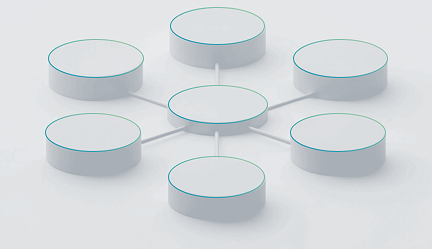Introduction
No part of the healthcare ecosystem today has remained untouched with Artificial Intelligence (AI) use cases, unlocking layers of insight from diagnostics to drug discovery, from patient care to process operations. As we look ahead to the next decade, industry leaders and innovators foresee an era where AI technologies will make healthcare more personalized, efficient, and accessible. This article explores predictions for AI’s role in healthcare over the next ten years, backed by expert insights and the latest industry data.
1. Personalized Medicine: A Reality at Scale [1]
AI will play a pivotal role in advancing personalized medicine by analyzing genetic, environmental, and lifestyle data to create tailored treatment plans.
Predictions:
- Precision Therapies: AI will enable the development of targeted therapies, reducing trial-and-error in treatment.
- Genomic Integration: With advancements in AI, genomic sequencing will become routine, helping clinicians predict diseases before symptoms arise.
Example Insight: AI-driven platforms like Insitro are already leveraging machine learning to identify disease patterns, accelerating the creation of personalized treatments for conditions like cancer and neurodegenerative disorders.
2. AI-powered Diagnostic: Driving Timeliness and Accuracy [2]
AI is enhancing diagnostic accuracy, enabling earlier detection and intervention for various diseases.
Predictions:
- Advanced Imaging: AI tools will achieve near-perfect accuracy in imaging-based diagnostics for conditions such as cancer, cardiovascular disease, and neurological disorders.
- Wearable Devices: Smart devices powered by AI will continuously monitor vital signs, alerting users and clinicians to potential health issues.
Example Insight:Google’s DeepMind has demonstrated AI’s diagnostic potential by developing algorithms that detect eye diseases with accuracy rivaling top ophthalmologists.
3. AI in Drug Discovery: Faster and Cheaper [3]
AI will significantly accelerate drug discovery, cutting costs and timelines while improving success rates.
Predictions:
- Discovery Acceleration: AI models will reduce drug discovery timelines by 50% or more, enabling quicker responses to health crises.
- De Novo Drug Design: AI will create entirely new molecules tailored to specific diseases, increasing the chances of success in clinical trials.
Example Insight:XtalPi’s Intelligent Digital Drug Discovery and Development (ID4) platform combines AI and quantum computing to identify promising drug candidates, reducing the need for extensive trial-and-error processes.
4. Telemedicine and Virtual Care: Personalized at Scale [4]
Telemedicine will integrate AI to deliver comprehensive and personalized virtual care from diagnostics and monitoring, to therapeutics, to ongoing care.
Predictions:
- AI Assistants: Virtual assistants will enhance telehealth by triaging patients and providing real-time insights during consultations.
- Remote Monitoring: AI-powered remote monitoring tools will ensure continuous care for chronic conditions.
Example Insight:Teladoc Health’s integration of AI into its telemedicine platforms showcases how virtual assistants and real-time analytics can improve patient outcomes.
5.Integration of AI with Genomics and Proteomics [5]
AI will become integral to analyzing complex biological datasets, uncovering insights that drive innovation in treatments.
Predictions:
- Omics Revolution: AI will analyze multi-omics data (genomics, proteomics, metabolomics) to unlock new pathways for drug development.
- Synthetic Biology: AI will aid in designing synthetic genes and proteins for therapeutic applications.
Example Insight:Aitia’s Gemini Digital Twins use multi-omics data and causal AI to simulate diseases, accelerating the discovery of novel therapies.
6.The Rise of Self-Driving Labs [6]
AI and robotics will converge to create fully automated laboratories.
Predictions:
- Faster Experimentation: Self-driving labs will test hundreds of hypotheses simultaneously, reducing the time from discovery to implementation.
- Integrated AI Models: These labs will leverage integrated AI models for seamless data collection, analysis, and interpretation.
Example Insight:The University of Toronto’s self-driving lab uses machine learning to optimize drug formulations, significantly accelerating R&D timelines.
7.Advancing Predictive and Preventive Healthcare [7]
AI will shift healthcare’s focus from treatment to prevention, reducing the burden of chronic diseases.
Predictions:
- Predictive Analytics: AI will identify at-risk populations for conditions like diabetes and cardiovascular diseases, enabling early intervention.
- Behavioral Health Monitoring: AI tools will analyze speech and behavior patterns to detect early signs of mental health issues.
Example Insight: Predictive models by companies like Valo Health are already improving outcomes by identifying patients likely to benefit from specific treatments.
8.Enhancing Operational Efficiency
AI will optimize healthcare operations, reducing costs and improving resource utilization.
Predictions:
- Smart Scheduling: AI systems will manage staffing and patient flow, minimizing wait times and enhancing patient satisfaction.
- Fraud Prevention: AI will detect billing and insurance fraud, potentially saving billions annually.
Example Insight: Boston-based Olive AI is automating administrative tasks in hospitals, helping reduce overhead costs and improve operational efficiency.
9.Tackling Bias and Promoting Ethical AI
Ensuring AI fairness and inclusivity will be critical as its adoption grows.
Predictions:
- Bias Detection: AI tools will integrate mechanisms to identify and correct biases in training data.
- Global Standards: International guidelines will mandate ethical AI development and deployment.
Example Insight:The World Health Organization’s ethical AI guidelines emphasize transparency, inclusivity, and equitable access to AI-driven healthcare solutions.
10. Financial Growth and Investment Opportunities [8]
Predictions:
- Market Valuation: The AI healthcare market is expected to grow at a CAGR of 38.1%, reaching $194 billion by 2030.
- Increased PE Involvement: Private equity and venture capital funding will flow into AI startups focused on diagnostics, drug discovery, and healthcare operations.
Example Insight:Startups like Insilico Medicine and XtalPi are securing multimillion-dollar funding rounds, reflecting investor confidence in AI’s transformative potential.
11. Navigating Regulatory Landscapes [9]
As AI adoption grows, so will the complexity of regulatory frameworks governing its use in healthcare.
Predictions:
- Global Harmonization: Regulatory bodies like the FDA and EMA will work towards harmonized guidelines for AI tools.
Real-Time Monitoring: AI tools will require continuous validation and real-time performance monitoring.
Predictions:
- Global Harmonization: Regulatory bodies like the FDA and EMA will work towards harmonized guidelines for AI tools.
- Real-Time Monitoring: AI tools will require continuous validation and real-time performance monitoring.
Example Insight:The FDA’s recent updates to its Software as a Medical Device (SaMD) framework highlight the need for robust post-market surveillance of AI-powered tools.
- Sources:
[1] Epicflow - New Technology Trends in Aerospace and Defense Industry [2025] (link) [2] StartUs Insights - Top 10 Military Technology Trends & Innovations for 2025 (link)



